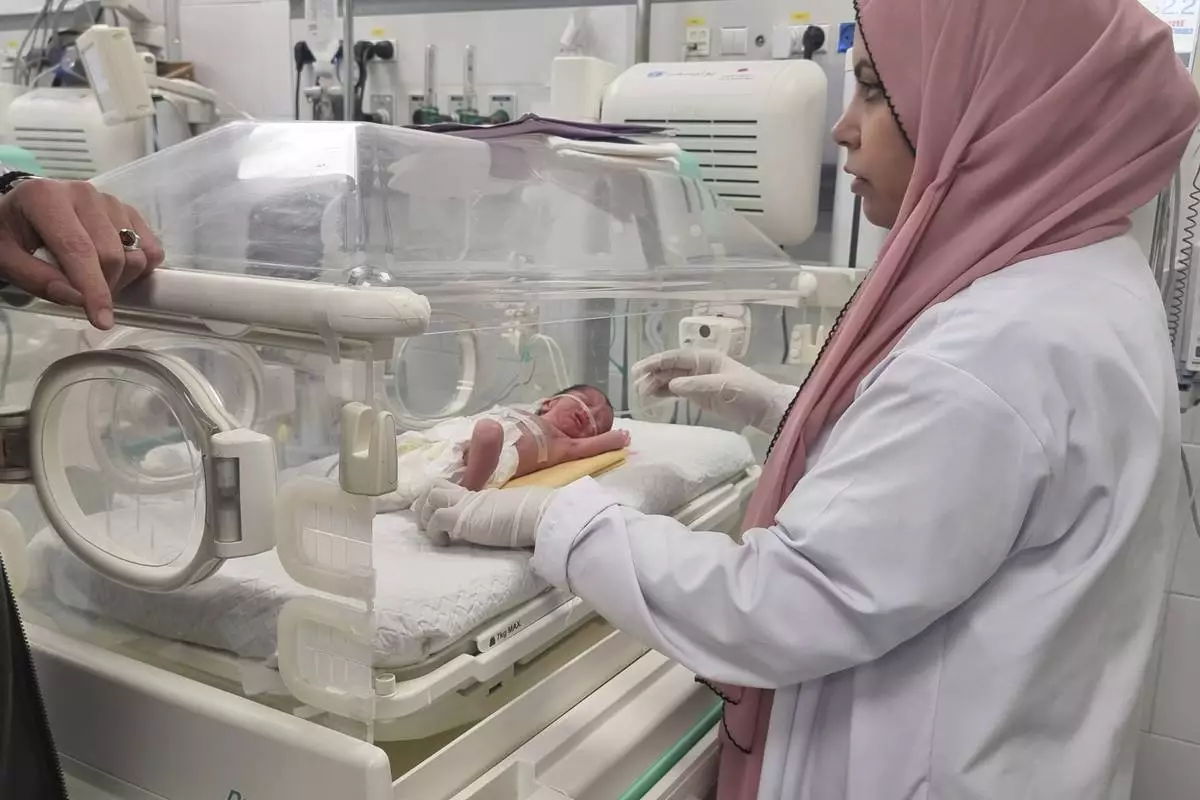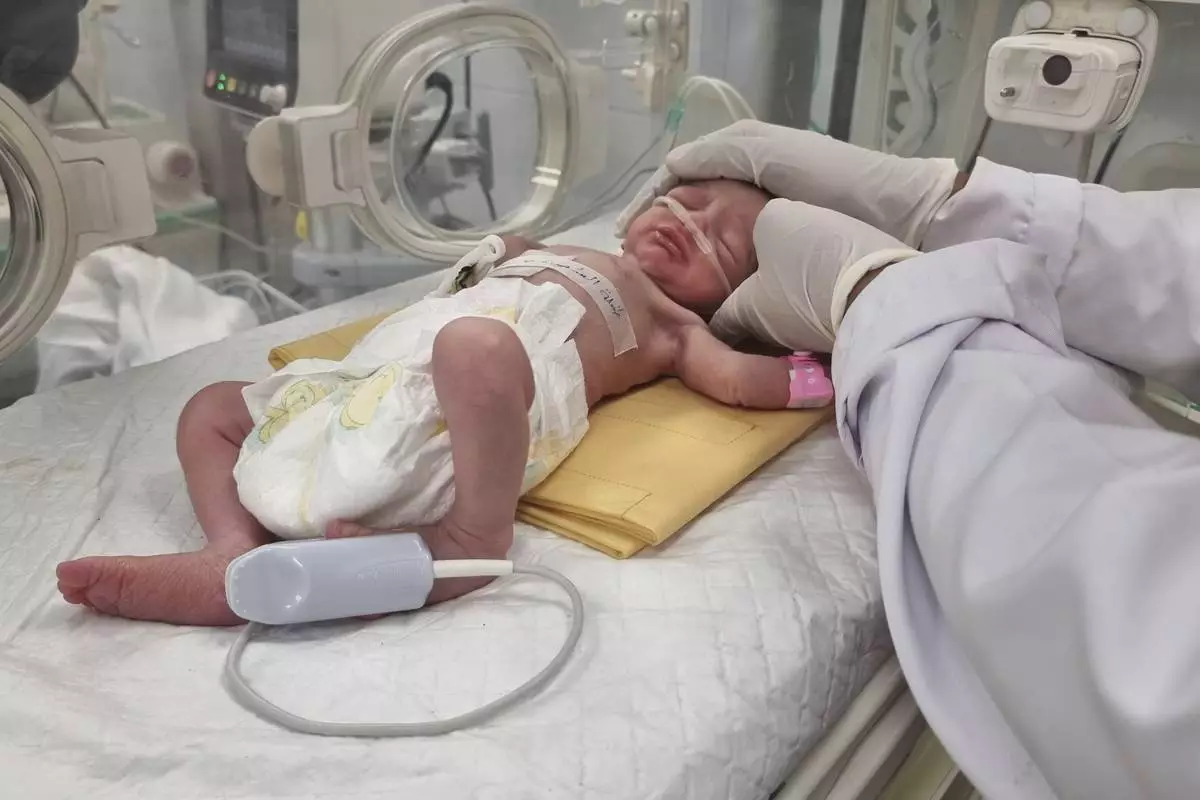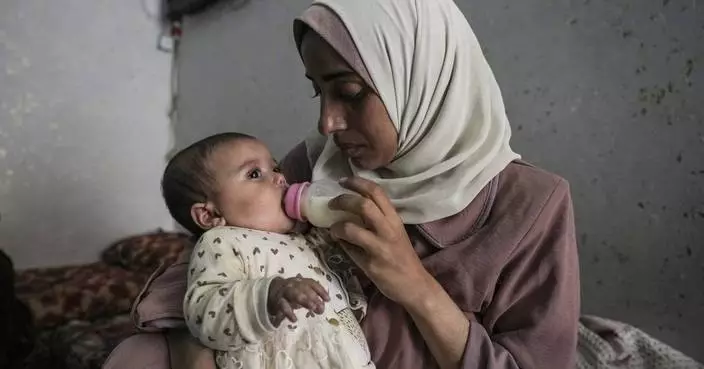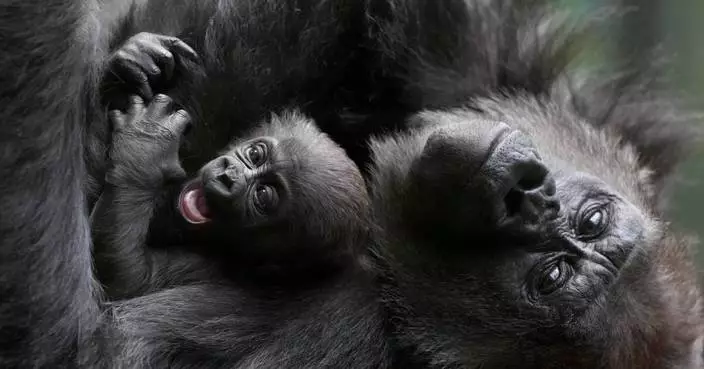Little Amelia Moe was born looking like a “little plastic doll” due to a rare autoimmune disorder called ichthyosis.
A young mum whose baby has skin like a snake was told by medics to bathe the one-year-old in bleach every other day to ward off infection, due to a rare condition which leaves the tot’s skin covered in scales.
Diagnosed with the rare autoimmune disorder lamellar ichthyosis, which sees her skin thicken and shed every couple of weeks, like a snake’s, Raven Ford’s daughter, Amelia Moe, cannot use soap as her skin is so sensitive.
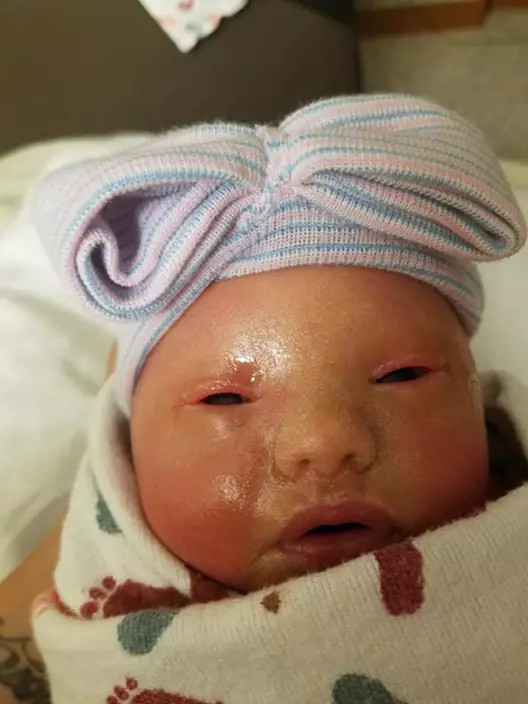
Amelia when she was first born (PA Real Life/Collect)
But retail worker Raven, 23, of Superior, Wisconsin, USA – also a mum to Benjamin Faice, six, and Cole Ford, two – has been criticised for her hygiene routine, saying: “Because Amelia can’t use soap, I put two tablespoons of bleach in her bath water every other day.”
She continued: “It’s controversial, and not everybody is comfortable with it, but it’s been recommended by dermatologists and it’s the only way to kill the bacteria under her scales.
“If we don’t do this, she can get infections or pockets of oil, which show up like yellow bumps on her scalp.”
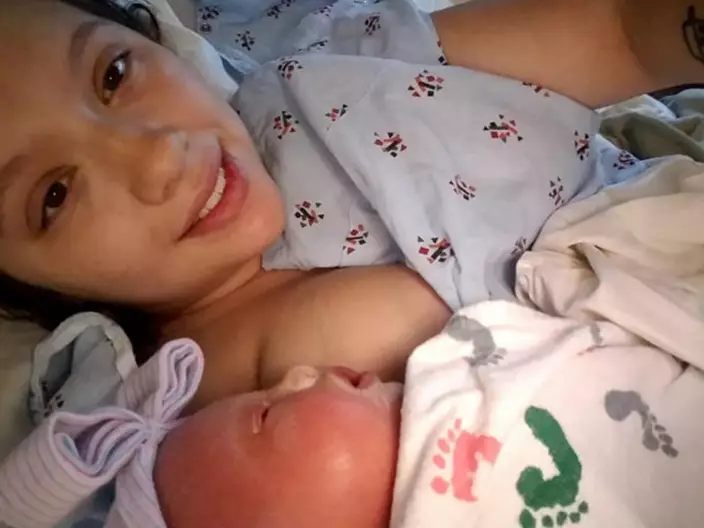
Raven with Amelia when she was first born (PA Real Life/Collect)
Raven said she and her partner, officer worker Gary Moe, 43 -Amelia’s dad – knew the moment she was born at St Mary’s Medical Centre in Duluth, Minnesota, that something was wrong.
She continued: “She looked like a little plastic doll. She had this build-up of really thick skin, which looked very tight and shiny.
“She couldn’t close her mouth or eyes, so doctors weren’t sure at first if she had eyelids, and it covered her hands and feet so much that there were no visible prints.”
As ichthyosis is so rare, medics were initially baffled.
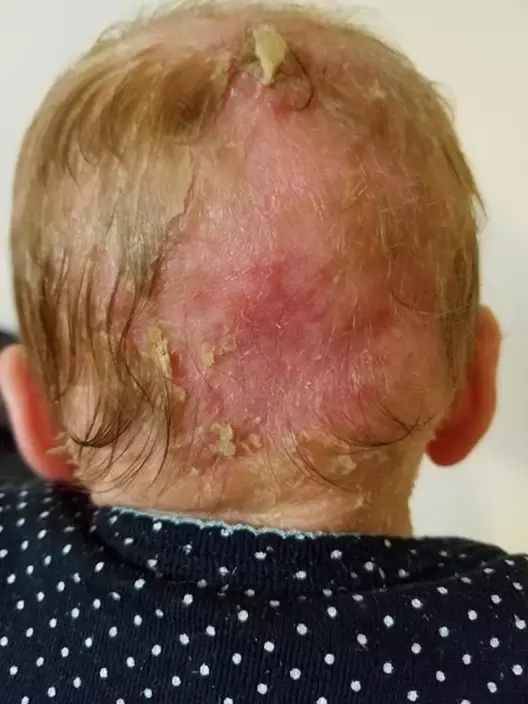
The back of Amelia's head (PA Real Life/Collect)
But, the following day, they consulted with a specialist at the University of Minnesota, who confirmed the diagnosis but could not determine at that stage what form of the condition Amelia had.
There are several different types, all of varying degrees of rarity and severity – the most extreme of which can see babies die shortly after birth.
“The not knowing was the worst feeling in the world,” said Raven. “We were told not to Google ichthyosis, but I couldn’t help myself. I just wanted to know what was happening.”
She continued: “Some forms are really severe and carry quite bleak life expectancies, so it was terrifying thinking Amelia might have to go through that.
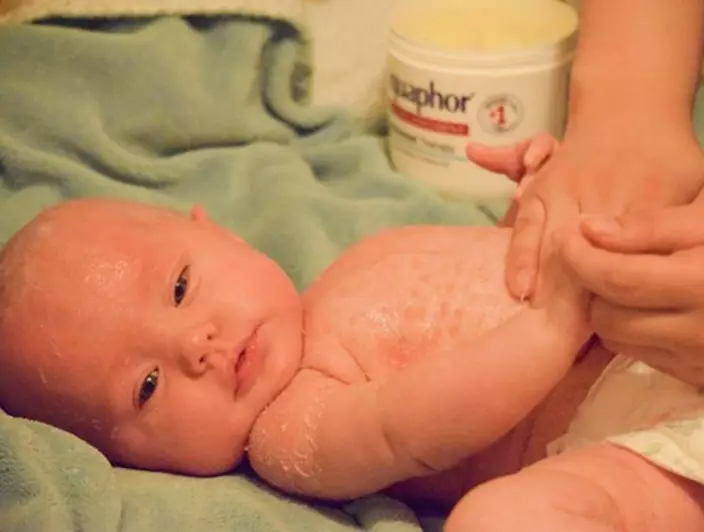
Amelia having lotion applied (PA Real Life/Collect)
“I had so many questions, and just needed to know what type she had.”
While the family is awaiting genetic testing to be completely certain, doctors are now confident Amelia has lamellar ichthyosis which, according to The Ichthyosis Support Group, occurs in approximately one in every 200,000 UK births and is currently incurable.
However, symptoms, including sore, thickened and flaky skin, can be managed using medicinal creams.
For the first 10 days of Amelia’s life, she remained in hospital – during which time her hardened skin began to crack and bleed at her joints, so her parents and a nursing team applied ointments every couple of hours, including Vaseline around her eyes.
“We have to do so much day to day to care for Amelia,” said Raven, who takes her daughter to regular appointments at University of Minnesota Medical Centre to discuss her ongoing needs. “She takes fluoride supplements for her teeth, as we were warned the condition can cause some dental abnormalities.”
She continued: “We also have to put Aquaphor petroleum jelly around her mouth when she eats otherwise the food will stain her skin.
“Her hair is quite brittle and can fall out easily, and her nails have begun to build up and harden too.
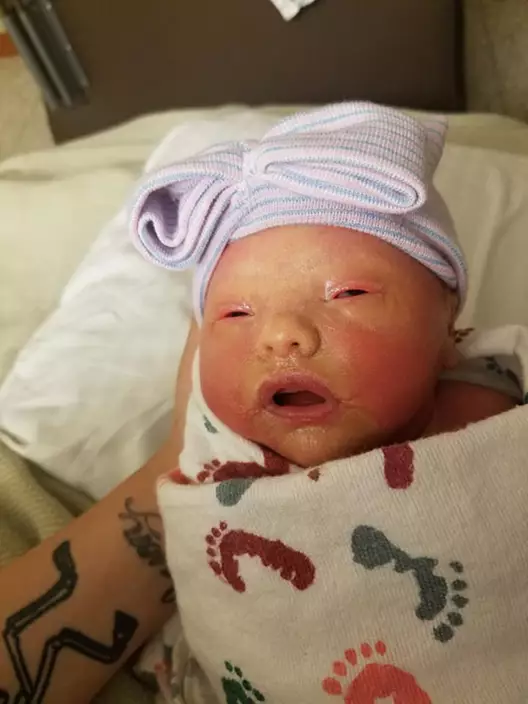
Amelia as a newborn baby (PA Real Life/Collect)
“We read on some support groups about people with ichthyosis having such thick, tough nails that they need to cut them with plyers, and the skin on the bottom of their feet being so tough they exfoliate with sandpaper. We haven’t had to do that with Amelia though, thankfully.”
Now, Raven manages Amelia’s symptoms by bathing her twice a day, and keeping her skin constantly topped up with moisturizers and steroid creams.
Where her skin is particularly scaly, she cannot wear certain clothing in case it snags and tears off.
“Anything too loose risks snagging, but anything too tight cuts into her and makes her bleed, so we have to be really careful,” Raven said.
She added: “She’s just started crawling, which causes sores on her knees, so we’re keeping her covered up in trousers made of soft, gentle material.”
As Amelia does not have sweat pores, summer is an especially difficult time.
Mostly, her parents avoid taking her out in scorching temperatures but, if it cannot be avoided, they keep her temperature down with ice packs and a special cooling towel.
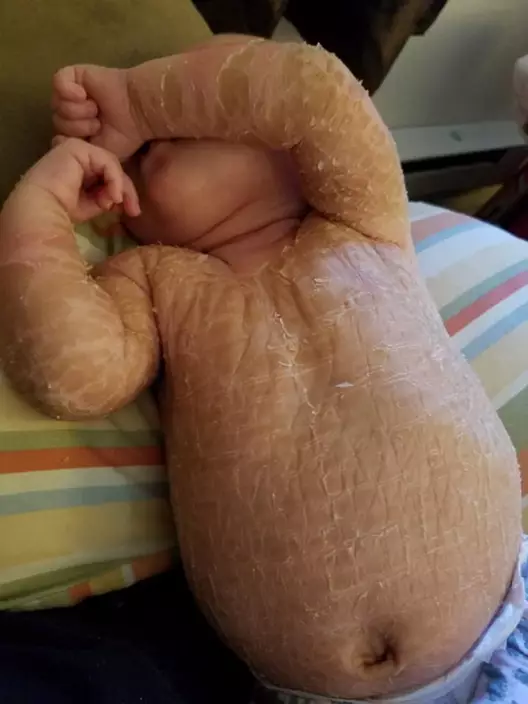
Amelia's torso (PA Real Life/Collect)
Over time, the youngster’s skin has settled into a cycle of building up and shedding.
Raven explained: “She starts out smooth, then her skin gets darker and shinier as it builds up. Eventually, she’ll be unable to close her eyes, at which point we have to start using a type of topical medication called Tazorac cream.
“Then, her skin will start to shed and peel. Thankfully it doesn’t bleed anymore like it did when she was first born.”
Raven continued: “Her hands and feet are largely unaffected, but the peeling on her face takes around a week and the peeling on her scalp takes two.
“Her torso is more or less always scaly, with a texture like you’re petting a snake.”
Sadly, over time, Amelia’s condition has seen Raven subjected to thoughtless comments from strangers.
On a number of occasions, passers-by have told her off after assuming Amelia’s appearance is down to severe sunburn.
And once, shockingly, she said a lady told her she was selfish for wanting more children in case they, too, had the condition.
“That was the most upsetting comment,” said Raven. “I didn’t even know this person. She just butted in with a conversation I was having with a friend.”
“Amelia is such an easy-going child. Yes, we have to do things a little differently, but she is still very happy so it hurts to be called selfish,” Raven added.
“When people do make these comments, I either ignore them or try to educate by explaining what ichthyosis is.”
Speaking for the first time, Raven, who was recently helped by kindly strangers, when she set up a GoFundMe page to help ease the cost of the parts of Amelia’s care not covered by insurance, is keen to raise awareness of the condition.
She is also calling for strangers to be kinder and not to judge people on face value.
She said: “I’d really like people to stop judging things they think are out of the ordinary – especially parenting choices. It’s upsetting when people tell me Amelia is sunburnt, or react negatively when I explain why I buy so much bleach.
“You don’t know what someone is dealing with, or why they are making the choices they are. Everyone has their own reasons – don’t assume it’s all down to bad parenting.”



